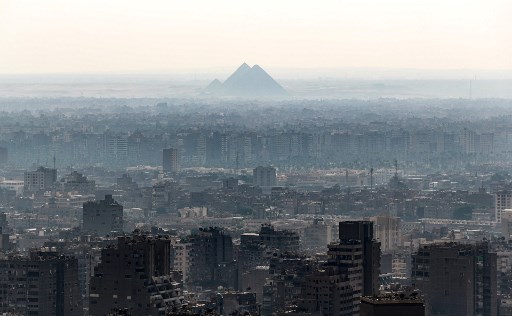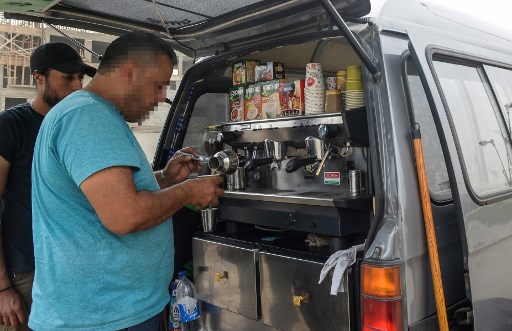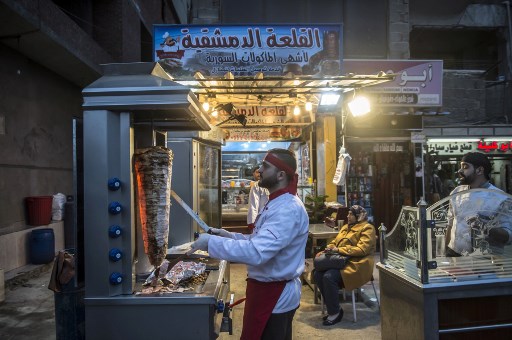“What hurts my husband the most is the fact that, even in our war-torn homeland, filled with gunmen from all over the world, we have never been beaten or humiliated, while the country we took refuge in tortured and insulted us, and made us curse everything and everyone who caused us humiliation, and hate life.” Rahaf’s husband Mohamed* is a Syrian refugee who was forcibly deported by the Egyptian authorities back to Damascus. At Cairo International Airport, the officer allowed Mohamed a one-minute phone call before boarding him onto an al-Cham Wings flight. Mohamed dialed his wife’s number. Rahaf remembers: “he told me to quickly call my family and have them meet him at the airport with his military service certificate (which states he has fulfilled his compulsory service.) He was scared that, without it, he would be enlisted immediately upon his arrival.”
There is an abundance of stories like Mohamed’s. Take, for instance, Ghayath al-Jundi who is a British citizen of Syrian origin. In 2014, Ghayath arrived to Egypt for a sightseeing tour when he was suddenly arrested at the airport, humiliated, called names because of his origins, and threatened with deportation to Syria. Not even his mother was spared insults.
But Ghayath was not alone in that old room inside Cairo International Airport. Fate has placed him there with another 100-150 Syrians. Women, children and elderly, all arrested and facing deportation because they were Syrians, although carrying valid residency and refugee cards, issued by the Office of the United Nations High Commissioner for Refugees ‘(UNHCR). Among the detainees were businessmen who invested millions in projects inside Egypt.

I had a conversation with Ghayath over Skype: “I was treated inhumanely, in every sense of the word, by a 40-something officer,” he told me. “It made me decide never to step foot in Egypt again as long as I live, although I was very fond of that country. Ever since, I’ve refused to even make business trips to Cairo and my work suffered a lot for it.”
This investigative report took place over six months and documented the deportation of six Syrian refugees to Syria, and six others to neighboring countries. The intervention of international refugee and immigrant organizations did nothing to stop the deportations, signaling Egypt’s infringement of international treaties of which it is a signatory.
Furthermore, Egypt imposes restrictions on refugees who had at some point engaged in activities against Syrian president, Bashar al-Assad. This is all happening in full view of international organizations, primarily UNHCR and its partners, whose role is to offer support, protection, and care services to refugees.
Egypt’s practices violate the 1984 Convention against Torture, which stipulates “No State Party shall expel, return (“refouler”) or extradite a person to another state where there are substantial grounds for believing that he would be in danger of being subjected to torture.”
According to the head of Free Syrian Lawyers Association (FSLA) Ghazwan Qurunful, Egypt is also violating the 1951 Refugee Convention and the 1967 Protocol thereof which asserts that “refugees should not be returned to a country where they face serious threats to their life or freedom.”
Mr. Qurunful notes that these conventions represent the international legal framework that defines the legal status of refugees and their rights. “The principle of non-refoulement is fundamental as one of the rules of customary international law that is binding on states, even those that did not sign the 1951 Convention.”
Egypt did sign both conventions, according to the UNHCR website, pursuant to Presidential Decree article 154 that was issued on 6 April 1986, published in the Official Gazette No. 1, on 7 January 1988.
Death or detainment
Whether they return of their own volition or by forced deportation, Syrian refugees face dangers at home, which put their lives and freedom on the line.
If a refugee wants to return to an area that is not under the regime’s control, he is all the same at risk of getting killed by bombs, explosive barrels, or chemical weapons fired by the regime’s air force, or the Russian’s or the coalition. Also, he may be subject to arrest or maybe even death at the hands of fundamentalist armed groups that control some parts of Syria, according to Anwar al-Bonni, head of the Syrian Center for Research and Legal Studies.
As for the areas that are under the regime or its allies’ control, that same refugee risks being on the regime’s “wanted” list and face prosecution. The list includes anyone who declares opposition to the Syrian regime, criticizes its performance, or objects to any of its practices, according to al-Bonni: “In the areas that were taken back by the regime, such as Duma, Daria, Der’a, and Homs, thousands of cases were documented of former opposition activists who were arrested or assassinated, with tens of cases of torture killings, all with international or Russian guarantees.”
The Syrian Network for Human Rights documented the disappearance of 600 people who were deported from Lebanon to Syria. “We don’t know where they are,” concur al-Bonni and Qurunful.
Egypt’s denial
“Even though Mohamed has nothing to do with politics, the authorities deported him when they discovered that one of his Egyptian coworkers had been in Syria and fought with armed militias. When it comes to politics, we are ignorant. We fled Syria to escape war and destruction,” Mohamed’s wife tells me. She continues, “They interrogated him and were convinced of his innocence. ‘We know you are not guilty of anything. But we still have to honor you’ they said to him.”
This is all happening in full view of international organizations whose role is to offer support, protection, and care services to refugees.
The Syrian army “honored” Mohamed by coercing him to do additional military service, during which he was commanded to fight armed groups opposed to Assad. Mohamed pleaded with the officers: months of torture in Egyptian prisons had left him psychologically unstable and prone to epileptic seizures. But no reason was enough to spare him this ordeal. He ended up falling captive to an armed group.
Mohamed’s wife notes that the Egyptian authorities did not stamp her husband’s passport before his departure, as they continue to deny such deportations are happening.
Badr Abdul-‘Aty, a spokesman for the foreign ministry, claims those who left Egypt did so of their own accord and for personal reasons. He refutes allegations of mistreatment of refugees and instead holds that Egypt is “still facilitating procedures for Syrians, because we maintain a stable position of supporting their revolution,” during a press conference held at the foreign ministry on 22 December 2013.
International appeals against deportation
The press conference took place amidst international appeals to stop deporting Syrian refugees.
In October 2013, Amnesty International asked Egypt to stop the deportation of 36 Syrian refugees to Damascus. In April 2014, Amnesty spoke against the deportation of two refugees and one asylum seeker, as well as another 56 refugees in November of that year.
For its part, Human Rights Watch revealed that Egypt deported 2 Syrian refugees to Damascus on 12 January 2013, and was about to deport 13 others had it not been for the NGOs intervention. On 25 July, international immigration authorities announced that 14 refugees and asylum seekers faced deportation.
Al-Bonni says that the Fourth Geneva Convention considers deporting a refugee back to his country a crime against humanity.
Refugees are protected by international humanitarian law. The hosting country cannot deport a refugee without a trial and a court order, according to Hussam Sarhan, a lawyer and board member of the Union of Syrian Lawyers.
UNHCR to refugees: “We can’t do anything about it.”
“After receiving threats from the police,” Rahaf recalls, “my husband filed a complaint at the UNHCR office asking for protection. They reassured him that no deportation will take place, and urged him to report to the office should any more problems arise. So I did as soon as he was arrested. The commission promised to intervene. A few days passed with no sign from them. When I called their emergency department on 25 June, they insisted Mohamed should be the one calling and not me. But how is it possible for someone who has been missing for days to get in touch? Then, I got a call from Mohamed asking for 300 dollars, a request I took to mean that he was about to be deported. So I called UNHCR again. Their response was: “this is beyond us. We cannot do anything about it.” And yet, my husband and I carry the yellow card. It is the commission’s responsibility to provide protection for us.”
Rahaf continued to reach out to international organizations, such as PSTIC, and Egyptian lawyers working with the Syrian community. The answer was the same: “we cannot help you.”
Abdo Abdul-Ghafour, a board member of the Union of Syrian Lawyers, underscores that the 1951 and 1984 agreements prohibit expelling or deporting refugees, and hold the UN Refugee Agency as primarily responsible for implementing these agreements and protecting the refugees from any dangers or harm they may face.
Abdul-Ghafour asserts the law maintains the right of the refugees to file a lawsuit in the hosting country to stop their deportation, and that the state should not deport any refugee before getting a court order. The international agency should follow this procedure and make sure it is implemented, according to the 1951 agreement.
A lawsuit against the government
Human rights activists filed lawsuits at the Administrative Judiciary court in December 2013, demanding that the president of the republic and the government stop the implementation of, and annul, the decree issued by the State Security branches in Alexandria and Beheira to deport 87 Syrian refugees who were accused in lawsuit number 2942 (Gomrok), and another 45 refugees accused in lawsuit number 3390 (Rasheed), and to grant them residence & asylum in Egypt.


I sit with Rama, whose brother Marwan faces deportation. Marwan was first arrested because he was carrying an expired residency card. “Being a prominent anti-Assad activist also, Marwan was interrogated. The National Security officer cursed and called him names, and threatened to have him deported should he participate in political activities again. My brother did not take the threats seriously at first. He continued to join protests, and express his opinions on Facebook. Until one night, a gang of thugs stopped him on the street near where he lives, threatened to kidnap and kill his family members if he continued his activities. That is when Marwan decided to go to Europe where he can continue his political activism against Bashar’s regime. He left on a boat. But as it crossed the Mediterranean, the boat capsized and Marwan drowned.”
The waves devoured the dreams of a young man whose only fault was that he desired a safe life. “We lost our passion for life after Marwan passed away,” laments Rama.
The same fate awaited hundreds in Egyptian airports.
Of the 100, mostly handcuffed detainees at Cairo International Airport, Ghayath, a senior official at one of the international human rights organizations, remembers a businessman with his mother and wife and children. “The officer hurled insults at the man’s mother who sat there crying. The man told the officer that he was an investor and had 15 million pounds worth of projects in Egypt. The officer paused for a second, only to resume his insults.”
Ghayath adds, “All of them were detained against the law, just because they were Syrians, without food or water, deprived of access to toilets. I saw children crying hard of hunger. Officers and soldiers insulted Syrian men and women intentionally. I saw a security guard insisting to search a Syrian woman’s suitcase after it came out of the X-ray machine. He opened it and, although it was green lit by the machine, put his foot inside it, cursed the lady and said, “Damn you, you deserve to be exterminated by Bashar”.
Those were the worst hours in Ghayath’s life. It all started when an airport employee checked his passport and found out he was of Syrian origin. She called 4 security officers. He was told that he was to be deported to Syria. Ghayath protested that he is a British citizen. “Yes, but you’re of Syrian origin,” was the answer. The officer confiscated Ghayath’s cell phone. Luckily, Ghayath had another phone, from which he called his British wife who contacted the embassy immediately. The embassy in turn contacted the airport authorities. A few minutes later, the same officer returned with a smile on his face and told Ghayath: “Welcome to Egypt, dear, consider yourself at home.” But Ghayath left the airport and took refuge at the British ambassador’s home in Cairo, where he stayed the night and left for the UK the next day.
Ghayath’s is not an individual case. It is all but part of a systematic behavior displayed by the government over long periods of time.
What Ghayath witnessed, Human Rights Watch had denounced one year earlier. The organization sounded alarms over the detaining of Syrian refugees at Cairo International Airport, and demanded that a Syrian asylum seeker of Palestinian origin and his son be allowed access into the country, and be spared the dangers they would face if they were to be deported to Syria.
In October 2013, Amnesty International demanded the release of 724 detainees, all refugees and asylum seekers, from Egyptian prisons. Later in April, it called for the liberation of another 140 detainees in Alexandria, and of 66 others in 2014.
“You have one of two options: leave or remain in prison”
Amnesty said that refugees were kept in detention for unlimited periods of time, regardless of whether or not the general prosecutor orders their release: “Detainees are faced with one of two choices: willingly agree to be deported, or remain in prison indefinitely.”
“All of them were detained against the law, without food or water, deprived of access to toilets, just because they were Syrians. I saw children crying hard of hunger. Both officers and soldiers intentionally insulted Syrian men and women.”
Against his and his family’s will, Raslan opted for being deported. He wanted to escape the horrors of Egyptian prisons where he was held without charges. Raslan was arrested, along with 21 other young men, as they crossed the southern Egyptian border coming from Sudan. They were detained at the Shalateen police station for three months before they were told they would either be deported to Syria or incarcerated in the foreigners’ prison in Qanater. The young man and his family had to agree to deportation.
The head of the Syrian Lawyers Union says these practices are against the international law, which maintains the right of a refugee or asylum seeker to protection and not to be deported or expelled unless he poses a threat to the national security of the hosting country, or to its social peace. Even then, the state should enable the refugee to appeal the deportation decision in a court of law. And if the court decides he should be deported, it is to a third country that would accept hosting him.
Harassment and abuse of political activists
A large number of political activists who voice their opposition to Assad’s regime are constantly harassed by Egyptian authorities and prevented from renewing their residency cards and passports. They are also under threat from the so-called “Zahran Group”, a nickname used to refer to thugs and gangsters, both Syrians and Egyptians, who try to terrorize the activists into quitting their political activity and stop opposing Assad.
In 2015, political activist Mazen Awad, who had come as a refugee to Egypt, helped organize a conference for the Arab Organization for Human Rights. Ever since, whenever he tried to renew his residency- without which he would not be able to continue his university studies- the immigration staff would find an excuse to delay his paperwork, under the pretext of a document missing here and an incomplete paper there: “Once, after I left the immigration office, a staff member ran after me and told me my residency would not be renewed because of my political activity. She advised me to never return to the office again ‘to avoid imprisonment and for your own safety. I love Syrians and that is why I am giving you this advice.”
“Shortly thereafter,” Mazen continues, “the Zahran Group began to pay me one visit after another. They found me seven times during my stay in Cairo & Giza. At times they spoke in Egyptian dialect; at others, they used the Syrian. Sometimes they attack me or threaten me verbally. Once, they assaulted me near Ramsis Square in Cairo. I fell after the first punch but passersby saved me. The other day, I was in Alexandria, working as an accountant at a Syrian restaurant. Holding the restaurant’s revenue that day in a plastic bag (12,000 EGP or US$730) and walking home, five masked young men in their early twenties appeared and blocked my way. However, they did not care for the money. They just put a knife to my neck and warned me: “If you don’t stop your political activism, we will kill your mother.”
Meet Mo’taz Shaklab, a member of the Syrian National Council, an anti-Assad body based in Istanbul- who was deported from Egypt to Turkey in the summer of 2013. Shaklab had been living in Cairo for the previous 25 years as an investor who founded, among others, an event-organizing company which employed more than 100 Egyptians.
Shaklab was accused of being a member of an anti-Assad group who stormed the Syrian Embassy in Cairo, in 2012, and caused physical damage to its premises and vehicles. An extensive solidarity media campaign, the intervention of international human rights organizations, and Shaklab’s own investment history in Egypt did nothing to stop his deportation to Turkey.
Growing Anti-Syrian Sentiment in Egypt
There is a strong bond between Egyptians and Syrians. Together, during the rule of Gamal Abdel-Nasser, they formed the “United Arab Republic” which lasted for three years. Thanks to the convergence of customs, traditions and lifestyle between the two people, Egyptians have a soft spot for Syrian refugees.
Things changed dramatically, however, after 30 June, following the impeachment of former President Mohamed Morsi. Media platforms suddenly began to disseminate hate speech against Syrians in Egypt, accusing them of supporting Morsi and the terrorist group, the Muslim Brotherhood. Accusations went far in some cases, further embittering the relationship between the two peoples.
Asylum-seeking for LGBTQ
Ghassan is a Syrian young man in his twenties, with European features and a prestigious job. Once, toward the end of 2013, he was in the underground metro, when a passenger suddenly screamed: “A Syrian! A terrorist! He has a bomb in his bag!” A large group of passengers circled him and some began to beat him before handing him over, at the next stop, to the security forces who, in turn, sent him to Egyptian Intelligence headquarters where he was tortured and humiliated. Then they realized it was a false accusation and let him go, not without threatening to deport him should he be arrested again for any reason.
After that episode, Ghassan lost his job. His life was turned upside down. He later applied for asylum in Sweden based on being gay. He got approved.
Syrian artist Hossam Malas, a politician with a Russian passport, was specifically targeted by the media that accused him of killing an Egyptian soldier and carrying out bombings in Sinai.
Hossam tells me how the story of his deportation unfolded:
“It all began with a phone call from the Public Information Office at the Presidential Palace in Syria― a guy named Jihad Barakat said a surprise was being prepared for me. He then sent me pictures on Viber that the media published and that went viral, accompanied with a long list of accusations: that I was a Muslim Brotherhood agent, and a guard for Hamas chief Khaled Mashal; that I took part in bombing the premises of the Syrian Defense Ministry and killed officers during the riot that took place near the Presidential Palace in Cairo. They also accused me of being a Salafi-jihadist.”
“At daybreak of 11 July 2013,” Malas recalls “a large number of masked security men broke into my house. We woke up to the sound of the door being brutally knocked off its hinges, and the furniture destroyed. The men surrounded me and my wife, then dragged me out and took me to a secret place that I later found out to be the National Security Agency. They confiscated my Syrian and Russian passports, my phones, and some of my possessions. After which I was taken to court and sentenced on bail. After my bail was paid off, I was surprised at being accused again, this time of being a Palestinian working for Hamas and the Muslim Brotherhood. The accusations were solely based on a video showing a masked person shooting at members of the Defence Force and killing one officer, although the killer’s silhouette is very different than mine.”
Refugees’ legal right to initiate judicial proceedings
Anwar Al-Bonni asserts that the international conventions protect the rights of asylum-seekers and refugees. The latter can file lawsuits against their deportation. However, the law remains largely unimplemented, especially by Arab countries where deportation risks are common.


As to whether sanctions are imposed against the countries that tend to violate international asylum laws and forcibly deport refugees, Ghazwan Qurunful asserts “There are no determined penalties against these countries, but there is a chance to prosecute them before international courts- such as The European Court of Human Rights ‘ECHR’- if the violating country is included in its charter, knowing that adhering to the charter and not violating the court’s ruling is primarily a moral and ethical decision, even though applying pressure on countries to respect the charter can sometimes pay off.”
Abdu Abdul-Ghani, a member of the Free Bar Association in Aleppo, points out that: “The 1951 Convention and the 1967 Protocol thereto defined the refugee as a person who has a well-founded fear of being persecuted for reasons of race, religion, nationality, membership of a particular social group or political opinion, is outside the country of his nationality and is unable, or owing to such fear, is unwilling to avail himself of the protection of that country; or who, not having a nationality and being outside the country of his former habitual residence as a result of such events, is unable or, owing to such fear, is unwilling to return to it. The Convention only excludes terrorists and individuals who committed crimes against peace, crimes against humanity, or war crimes or serious non-political crimes outside the country of asylum.”
“UNHCR is obliged to supervise this process, and intervene when needed, to guarantee that genuine refugees are granted asylum and never forced to return to countries where their lives might be endangered.”
For his part, Hussam Sarhan, a board member of the Union of Syrian Lawyers, said that the International Law fully protects all the rights of asylum-seekers until their applications are reviewed.
The UNHCR, the PSTK (an independent organization that offers psychological and humanitarian support), the Egyptian Ministry of Interior and the Ministry of Foreign Affairs, all ignored my email requests for comment.
Mohamed is being treated in Turkey for the traumas he underwent in Egypt, and after witnessing the horrors of war in which he was forced to fight and was consequently captured by forces opposed to Bashar al-Assad in Syria.
Ghassan’s plight is not any better. The young man is suffering from psychological problems at least as bad as Mohamed’s and is facing an uncertain future.
Ghayath, for his part, is trying to put harassment, insults and humiliation behind. The Cairo Airport épisode left him scarred and after his refusal to participate in any business trip to Egypt, he lost his job at the international organization.
*All names have been changed






